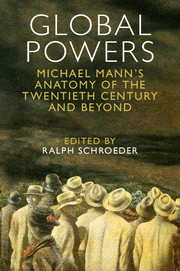Book contents
- Frontmatter
- Contents
- List of contributors
- 1 Introduction
- Part I Theory and history
- 2 The evolution of the sources of social power, and some extensions
- 3 The return of big historical sociology
- 4 Taming the chief: from evolutionary theory to political ideology
- Part II Political, economic, military and ideological questions
- Part III American exceptionalism
- Part IV Empire
- Part V Response
- Index
- References
4 - Taming the chief: from evolutionary theory to political ideology
from Part I - Theory and history
Published online by Cambridge University Press: 05 April 2016
- Frontmatter
- Contents
- List of contributors
- 1 Introduction
- Part I Theory and history
- 2 The evolution of the sources of social power, and some extensions
- 3 The return of big historical sociology
- 4 Taming the chief: from evolutionary theory to political ideology
- Part II Political, economic, military and ideological questions
- Part III American exceptionalism
- Part IV Empire
- Part V Response
- Index
- References
Summary
Michael Mann and Immanuel Wallerstein, our two greatest macrohistorical scholars, delivered on their long-standing promise to explain the origins of our times. We do have now a much clearer and broader vision of the past, if one cares to notice. The world in the meantime looks as complex and contradictory as ever. Many people despair that it would ever get better. Will it? Our tribute to the life achievement of Michael Mann goes in two steps. We heavily draw on his theories, and we must also draw on his own irreverence for we are going to disagree with Mann's rejection of social evolution. It is far from scholastic disputation. The evolutionary logic is not merely an academic construct but rather a matter of ideological and political power to change other sources of power in the coming decades.
Knowledge on power
After 1945, the world reconstruction boosted mightily the modern intellectual ambition to explain scientifically the patterns of human societies from the beginnings of history and into the future. The departure point was perhaps in the new grave awareness of the threats to life on earth, from the fascist exterminationism in the recent past to the looming future possibilities of nuclear war and global environmental disasters. The fears, however, were outweighed by tremendous optimism and the “can do” spirit of the age. The universal expectation of renewed progress was supported by victory over fascism, the postwar economic growth and welfare expansion, the end of terror and the beginnings of democratization in the communist Eastern Europe, and the independence of former colonies and their resolve to “develop.” Not in the least, worldwide expansion of university education and rapid accumulation of research led to a renewed hope in the abilities of modern science. The key collective actors of the post-1945 transformations were national states and the popular movements aspiring to become national states. Hence the centrality of states, state-directed development, movements, revolutions, and their ideologies for the research agenda of what became called (arguably too narrowly) historical sociology.
In the 1970s and the 1980s, historical sociology experienced its “Golden Age” prepared by the accumulation of social science research across many countries and academic disciplines. The theoretical formulations reconsidering the canonical topics of social science arrived in rapid succession. This “unthinking” of the nineteenth-century paradigms cleared a lot of underbrush.
- Type
- Chapter
- Information
- Global PowersMichael Mann's Anatomy of the Twentieth Century and Beyond, pp. 62 - 86Publisher: Cambridge University PressPrint publication year: 2016



